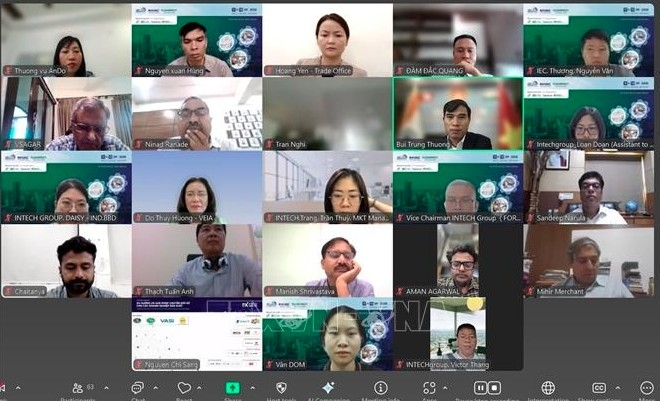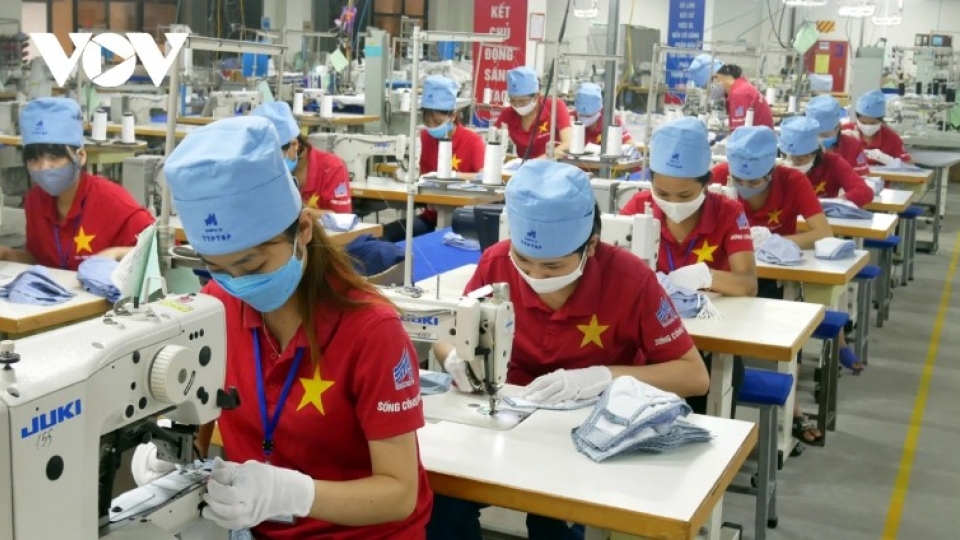Webinar highlights potential for Vietnam-India electrical and electronics cooperation
VOV.VN - A webinar on cooperation between Vietnam and India in the electrical and electronics sectors, co-chaired by Trade Counselor Bui Trung Thuong of the Vietnamese Embassy in India and Veer Sagar, Chairman of the Electronics and Computer Software Export Promotion Council (ESC), has brought together nearly 100 businesses from both countries.
Other attendees included leaders from industry associations such as the Vietnam Association of Mechanical Industry (VAMI), the Vietnam Electronic Industries Association (VEIA), the Indian Electrical and Electronics Manufacturers' Association (IEEMA), and the Indian Industries Association (IIA), along with large enterprises including ATS, Viettronics, INTECH, and LUMI.
Speaking at the opening, Counselor Thuong said Vietnam has become a major manufacturing hub, particularly in consumer electronics and assembly, hosting global giants such as Samsung, Apple, Intel, and LG.
Meanwhile, Vietnam’s electricity sector is rapidly expanding with a strategic focus on green energy, in line with the government’s commitment to sustainable energy transition and emissions reduction. With its favorable location, abundant workforce, and modern infrastructure, Vietnam is well positioned to become a regional and global center for electrical and electronics manufacturing.
He expressed hope that the webinar would help businesses on both sides build connections, exchange market insights, and stay updated on emerging technologies. These discussions, he said, would lay the groundwork for new investment and trade opportunities in the field.
ESC Chairman Veer Sagar said economic ties between the two countries have strengthened significantly since the ASEAN–India Free Trade Agreement (AIFTA) came into force in 2010. The agreement has ushered in a more stable and sustainable phase of bilateral trade.
He urged both sides to leverage this framework to expand cooperation in key areas like electrical and electronics manufacturing, strengths of both economies so as to reduce reliance on dominant markets.
By working together, countries in the region can build more resilient and self-sufficient supply chains, creating a foundation for inclusive and sustainable growth, he said.
Vinod Sharma, Director of Deki Electronics and Chairman of the Confederation of Indian Industry (Uttar Pradesh chapter), highlighted areas ripe for cooperation, including electronic component manufacturing, electrical equipment design, industrial IoT, and EV charging solutions.
He added that India’s robust policy support, including initiatives such as Make in India, Digital India, and production-linked incentives for components and hardware, presents strong opportunities for joint investment, technology transfer, and market expansion.
Do Thi Thuy Huong, Executive Board Member of VEIA, gave an overview of Vietnam’s electronics sector and outlined potential cooperation areas. These include components, semiconductors, high-tech and consumer electronics, digital transformation and IoT, as well as training and R&D.
However, she also identified several challenges that must be tackled, including technology gaps, competition for foreign direct investment, trade barriers, and skilled workforce shortages. To overcome these, she suggested enhancing trade dialogue, co-investment, technology sharing, and joint branding initiatives.
Representing ATS Corporation, Deputy General Director Vu Hau introduced the company’s core expertise in substation automation and SCADA-based power plant operation management. He announced plans to expand in the Indian market.
ATS’s Make in Vietnam technologies drew considerable interest from Indian partners at the upcoming ELECRAMA 2025 exhibition in Uttar Pradesh, thanks to their flexibility and reliability.
Dam Dac Quang, CEO of LUMI, proposed several modes of collaboration. These include sourcing Indian-made components to diversify input supply for Vietnamese manufacturers, encouraging Indian firms to establish production facilities in Vietnam, and making use of Vietnam’s strength in assembly to export finished electronics to India under preferential tariffs provided by AIFTA.
By working closely together, Vietnam and India can develop more flexible, sustainable, and autonomous supply chains. This partnership will not only enhance bilateral economic gains but also contribute to regional growth across Asia.




